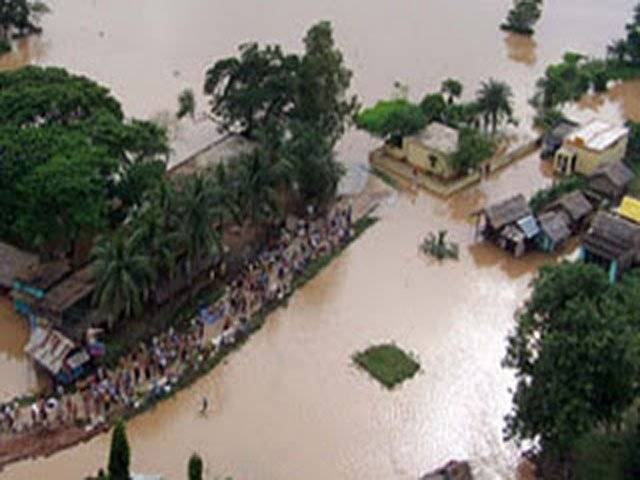ISLAMABAD - At a time when over nine million people affected by recent floods in Sindh are at the risk of diseases and widespread malnutrition, relief efforts reaching over five million people are under threat due to lack of funds. This was warned by a group of international aid agencies including Oxfam, Save the Children, Care and ACTED on Thursday. The group, urgently calling upon the donor community to step up its response, said that the flood relief programmes would face serious setback if funds were not released soon by the donor agencies to help those in need. A press release issued by the group says Oxfam will be forced to cut back on its efforts after December, meaning the 3.9 million people it had planned to reach would go without help. Save the Children has raised only 35 per cent of its global appeal for the Sindh floods so far. Care faces a shortfall of 91 per cent and is struggling to continue its relief programme at a time when the risk of an outbreak of disease and widespread malnutrition is escalating. Care has used its own resources to fund this response, which is focusing on emergency healthcare and food security. Due to a funding shortfall, weve only reached roughly 10 percent of the targeted 150,000 in need of emergency healthcare in the areas where we and our local partners operate, said Waleed Rauf, Country Director of Care International in Pakistan. The group though the appeal claims that the programmes of UN agencies also are affected by the sluggish funding as UNs $357 million appeal has only received $96.5 million so far. The 2011 floods flash appeal remains distressingly under funded with a 73 per cent shortfall and if more funding is not received relief supplies will run out within weeks which impacts UN agencies from providing life-saving clean water, sanitation, food, shelter and healthcare, said Stacey Winston, UN Spokesperson. The government of Pakistan also faces a funding crisis and might be forced to scale down relief efforts due to depleting resources, which has led to an increased need for the humanitarian agencies to step up their response. Over two months into the crisis millions of people are still without basics. If relief operations stop, it could lead to an unimaginable catastrophe. Healthcare, clean water and sanitation are needed to stem a looming public health crisis. The precarious food system is under threat as theres an acute food shortage, and many farmers will miss the winter cropping season. With winter approaching fast, millions of people who are still without shelter will be left out in the cold. We urgently need to see the same donor generosity and giving that took place last year during the floods, said Neva Khan, Oxfams Country Director in Pakistan. The floods that hit in August have affected over nine million people. More than two months into the disaster, over 1.58 million houses in Sindh and 26,000 in Balochistan have been damaged. People are forced to live in desperate conditions. More than three-quarters of the affected households have not received any shelter assistance while around 800,000 people are still displaced. According to the latest estimates three million people are in urgent need of emergency food assistance. The hand out says that diseases are on the rise and the lives of at least two million adults and three million children are at risk. Stagnant waters and approaching winter season have strengthened the risk of a major outbreak of dengue, malaria and acute respiratory infection. Over 160,000 pregnant women require lifesaving medical services in the next six months. We had expected the situation to stabilize by now but conditions are going from bad to worse. Each day that passes puts more children at risk of contracting diseases. Malnutrition levels among children under-fives are among some of our worst recorded cases. Childrens immunity is very weak, and we fear winter will make the situation worse if aid is not immediately stepped up, said Save the Childrens Pakistan Country Director, David Wright. Over 67 per cent of food stocks and 73 percent of the crops in thirteen districts of Sindh have been destroyed. Additionally farmers whose fields are under water will miss the winter planting season - which begins now - leading to hunger. Approximately 3.6 million people urgently require agricultural support to resume food production and income generation activities. It is unfortunate that the millions of flood affected populations have received so little humanitarian aid to meet their urgent food, water and shelter needs. These populations have lost everything and they require immediate assistance to be able to survive the coming winter months, and to have a chance to rebuild their lives, said Andy Buchanan, Country Director of ACTED.
Thursday, April 18, 2024
Underfunding puts millions of flood-hit at risk, say aid groups

Stefanos Tsitsipas advances in Barcelona
4:19 PM | April 18, 2024
Met Office predicts more rains across country till April 29
2:51 PM | April 18, 2024
Punjab changes school timings for summer season
1:55 PM | April 18, 2024
Enemies of Pakistan are unable to digest investment in the country: Ataullah Tarar
1:29 PM | April 18, 2024
IHC restores Bushra Bibi's appeal for shifting to Adiala Jail from Bani Gala
1:24 PM | April 18, 2024
Hepatitis Challenge
April 18, 2024
IMF Predictions
April 18, 2024
Wheat War
April 18, 2024
Rail Revival
April 17, 2024
Addressing Climate Change
April 17, 2024
Justice denied
April 18, 2024
AI dilemmas unveiled
April 18, 2024
Tax tangle
April 18, 2024
Workforce inequality
April 17, 2024
New partnerships
April 17, 2024
ePaper - Nawaiwaqt
Advertisement
Nawaiwaqt Group | Copyright © 2024





